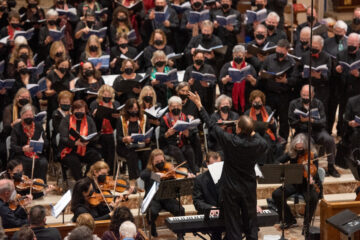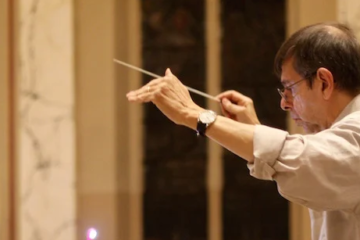It is perhaps a universal irony that the years we’d like to forget are also the years that we can’t. And, often, shouldn’t. 2020 was one of those years; so was 1968.
The connection between these hard times is the struggle for civil rights, which has always been both a fight for survival and an act of resilience. As one of the most endangered organizations of the COVID era, we can relate. But there is no moral equivalency between the value of an arts organization and that of human life. The pandemic may have threatened the existence of choral groups, but racial injustice has been doing the same to non-white Americans for centuries. The Black Lives Matter movement reminded us that that struggle is far from over.
Despite being in the throes of reinvention, trying to adapt to a new, virtual existence, we needed to respond—to raise our voices not just as choristers, but as allies. The fundamental DNA of the NHC, after all, is to serve the whole community, all included. As director Ed Bolkovac put it, we needed a project focused on social justice. That project was Great Day, an African American spiritual arranged by Moses Hogan (1957-2003), and it has particular resonance on Martin Luther King Day.
“We, as a community, need to take more responsibility for BLM and civil rights issues,” said Bolkovac. “The majority have to make it their problem to improve things for the minority.” He acknowledged that for a predominantly white, middle-aged group, this act of solidarity constituted “baby steps,” but that it needed doing.
Spirituals have long been a part of the NHC repertoire and have historical significance in the Civil Rights Movement. Great Day, an uplifting, triumphant piece often performed in church services, was chosen in part because it’s an easier, repetitious piece that helped ease the transition to virtual performing and encouraged singers to get off book. But it also ran the risk of being too nostalgic for the moment. Working with Chorale member and producer Peter Robinson of Audio Artisan, Bolkovac was able to create a montage that worked. Adding portraits of contemporary social justice leaders and activists reframed the piece, giving it immediate relevance. Baritone soloist Jermaine Woodard, Jr, steals the show, while expressive American Sign Language Interpreter Angel Rubinan is featured for further inclusivity.
Bolkovac is painfully aware that, given the limitations of producing Great Day virtually, it was a very superficial first step, but looks forward to future opportunities for inclusion initiatives, particularly with live concerts—because, as Dr. King said so perfectly, “Life’s most persistent and urgent question is, ‘what are you doing for others?'” In the New Haven Chorale, caring for each other is what we do.


